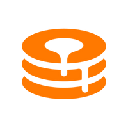-
 Bitcoin
Bitcoin $84,258.9872
0.35% -
 Ethereum
Ethereum $1,590.5943
1.14% -
 Tether USDt
Tether USDt $0.9998
-0.02% -
 XRP
XRP $2.0990
1.26% -
 BNB
BNB $587.2456
1.30% -
 Solana
Solana $132.5296
6.11% -
 USDC
USDC $0.9999
0.00% -
 TRON
TRON $0.2483
-2.37% -
 Dogecoin
Dogecoin $0.1557
1.96% -
 Cardano
Cardano $0.6199
2.68% -
 UNUS SED LEO
UNUS SED LEO $9.1185
-2.93% -
 Chainlink
Chainlink $12.4572
2.80% -
 Avalanche
Avalanche $19.2046
1.97% -
 Toncoin
Toncoin $2.9568
3.52% -
 Stellar
Stellar $0.2397
2.14% -
 Shiba Inu
Shiba Inu $0.0...01181
1.81% -
 Sui
Sui $2.0961
0.90% -
 Hedera
Hedera $0.1602
2.15% -
 Bitcoin Cash
Bitcoin Cash $330.4313
4.06% -
 Polkadot
Polkadot $3.6278
3.32% -
 Litecoin
Litecoin $74.9638
1.65% -
 Hyperliquid
Hyperliquid $16.4916
8.27% -
 Dai
Dai $0.9999
-0.01% -
 Bitget Token
Bitget Token $4.3499
0.87% -
 Ethena USDe
Ethena USDe $0.9990
-0.03% -
 Pi
Pi $0.6068
-1.04% -
 Monero
Monero $216.4766
0.12% -
 Uniswap
Uniswap $5.1795
0.94% -
 Pepe
Pepe $0.0...07203
1.55% -
 OKB
OKB $50.4898
-2.39%
What is a DAO and its governance model?
DAOs use blockchain tech for decentralized, transparent governance via smart contracts, allowing collective decision-making through various voting models.
Apr 07, 2025 at 06:14 pm
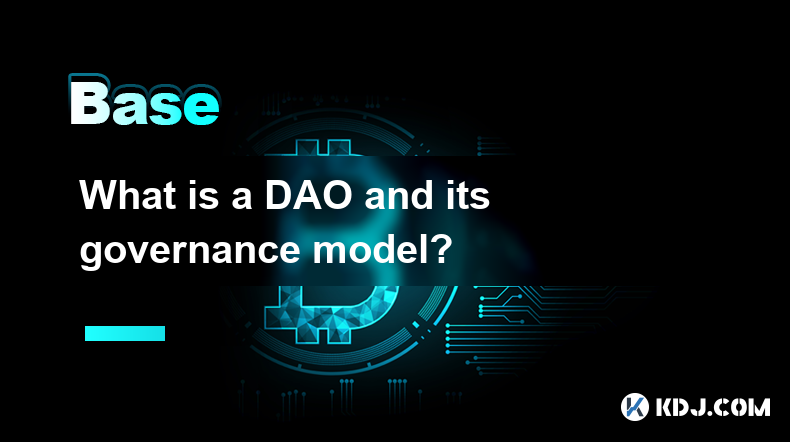
A Decentralized Autonomous Organization (DAO) represents a revolutionary approach to organizational management within the cryptocurrency and blockchain ecosystem. DAOs operate on blockchain technology, which allows them to function without a central authority, making them inherently democratic and transparent. The core idea behind a DAO is to create a system where decisions are made collectively by its members, often through voting mechanisms encoded in smart contracts. This article will delve into the concept of DAOs and explore their governance models in detail.
What is a DAO?
A DAO, or Decentralized Autonomous Organization, is an entity that operates on a blockchain, governed by smart contracts. Smart contracts are self-executing contracts with the terms directly written into code. These contracts automatically enforce the rules and execute decisions based on the collective input of the DAO's members. The absence of a central authority means that DAOs are managed by their community, making them a form of decentralized governance.
DAOs can be used for various purposes, such as managing investment funds, running decentralized applications (dApps), or even governing entire blockchain networks. The key feature of a DAO is its ability to operate autonomously, with decisions made through a consensus mechanism rather than by a single entity or group.
The Governance Model of a DAO
The governance model of a DAO is what sets it apart from traditional organizations. Governance in a DAO is typically achieved through a voting system, where members of the DAO hold tokens that represent their voting power. These tokens can be bought, earned, or distributed based on the DAO's specific rules.
The voting process in a DAO is usually facilitated by smart contracts, which tally votes and execute the outcomes automatically. This ensures that the governance process is transparent and tamper-proof. Members can propose changes, vote on proposals, and see the results in real-time, all on the blockchain.
Types of Governance Models in DAOs
There are several types of governance models that DAOs can adopt, each with its own set of rules and mechanisms. Some common governance models include:
Token-based Voting: In this model, the voting power of each member is proportional to the number of tokens they hold. This model is simple and widely used but can lead to centralization if a few members hold a majority of the tokens.
Quadratic Voting: This model aims to balance the influence of members by allowing them to allocate a fixed number of votes across multiple proposals. It is designed to prevent the dominance of wealthy members and encourage more equitable decision-making.
Delegated Voting: In this model, members can delegate their voting rights to other members or representatives. This can help streamline the voting process and increase participation, but it also introduces the risk of centralization if too much power is delegated to a few individuals.
Liquid Democracy: This model combines elements of direct and representative democracy. Members can vote directly on proposals or delegate their votes to others, and they can change their delegation at any time. This model aims to maximize flexibility and participation.
Implementing a DAO Governance Model
Setting up a DAO and implementing its governance model involves several steps. Here is a detailed guide on how to do it:
Choose a Blockchain Platform: Select a blockchain platform that supports smart contracts, such as Ethereum, EOS, or Tezos. Each platform has its own set of tools and features that can affect the functionality of your DAO.
Define the Governance Rules: Clearly define the rules that will govern your DAO, including how members can join, how proposals are made and voted on, and how decisions are executed. These rules should be encoded into smart contracts.
Create and Deploy Smart Contracts: Write the smart contracts that will enforce the governance rules of your DAO. These contracts should include functions for proposing, voting, and executing decisions. Once written, deploy the smart contracts on the chosen blockchain platform.
Distribute Tokens: Issue and distribute tokens to the members of your DAO. These tokens will represent their voting power and can be used to participate in the governance process.
Launch the DAO: Once the smart contracts are deployed and tokens are distributed, launch the DAO and invite members to participate. Ensure that the governance process is transparent and accessible to all members.
Monitor and Adjust: Continuously monitor the performance of your DAO and make adjustments as needed. This may involve updating the smart contracts, changing the governance rules, or addressing any issues that arise.
Challenges and Considerations in DAO Governance
While DAOs offer many benefits, they also come with challenges and considerations that must be addressed. Some of the key challenges include:
Security Risks: DAOs are vulnerable to hacks and exploits, as seen in the infamous DAO hack of 2016. Ensuring the security of smart contracts and the underlying blockchain is crucial to the success of a DAO.
Scalability: As the number of members and proposals grows, the governance process can become slow and cumbersome. Finding ways to scale the governance model without compromising its decentralized nature is a significant challenge.
Participation: Encouraging active participation from members is essential for the success of a DAO. Low participation rates can lead to decisions being made by a small group of members, undermining the democratic nature of the organization.
Legal and Regulatory Compliance: Navigating the legal and regulatory landscape can be challenging for DAOs, as they often operate in a gray area. Ensuring compliance with relevant laws and regulations is important for the long-term viability of a DAO.
Examples of DAOs and Their Governance Models
To better understand how DAOs and their governance models work in practice, let's look at a few examples. Some notable DAOs include:
The DAO: Launched in 2016, The DAO was one of the first and most well-known DAOs. It was designed to operate as a decentralized investment fund, with members voting on investment proposals. The DAO used a token-based voting model, where the voting power of each member was proportional to their token holdings.
MakerDAO: MakerDAO is a decentralized lending platform that uses a stablecoin called DAI. The governance of MakerDAO is managed by its community through a token-based voting system. Members can vote on changes to the protocol, such as adjusting interest rates or adding new collateral types.
Aragon: Aragon is a platform that allows users to create and manage their own DAOs. It offers a variety of governance models, including token-based voting, quadratic voting, and delegated voting. Aragon's goal is to make it easy for anyone to set up and run a DAO.
Decentraland: Decentraland is a virtual reality platform governed by a DAO. The governance model of Decentraland is based on token-based voting, where members can vote on proposals related to the development and management of the platform.
Frequently Asked Questions
Q: How can someone join a DAO?
A: Joining a DAO typically involves acquiring the DAO's governance tokens. These tokens can be purchased on cryptocurrency exchanges, earned through participation in the DAO's activities, or distributed by the DAO itself. Once you have the tokens, you can participate in the governance process by voting on proposals and contributing to the decision-making of the DAO.
Q: Can a DAO be dissolved or restructured?
A: Yes, a DAO can be dissolved or restructured through a governance process. If a majority of members vote in favor of dissolution or restructuring, the smart contracts governing the DAO can be updated or terminated. The specific process will depend on the DAO's governance rules and the smart contracts that enforce them.
Q: What happens if there is a tie in a DAO vote?
A: The outcome of a tie in a DAO vote depends on the specific governance rules of the DAO. Some DAOs may have tie-breaking mechanisms, such as a second round of voting or a decision by a designated group of members. Others may simply delay the decision until a clear majority is reached. The rules for handling ties should be clearly defined in the DAO's smart contracts.
Q: How can a DAO ensure the security of its smart contracts?
A: Ensuring the security of smart contracts is crucial for the success of a DAO. This can be achieved through several measures, including thorough code audits by reputable firms, using established and tested smart contract frameworks, and implementing security best practices such as time-locks and multi-signature wallets. Additionally, continuous monitoring and updating of the smart contracts can help address any vulnerabilities that may arise.
Disclaimer:info@kdj.com
The information provided is not trading advice. kdj.com does not assume any responsibility for any investments made based on the information provided in this article. Cryptocurrencies are highly volatile and it is highly recommended that you invest with caution after thorough research!
If you believe that the content used on this website infringes your copyright, please contact us immediately (info@kdj.com) and we will delete it promptly.
- Kaspa (KAS) Price Prediction Hints at Accumulation Before Potential Surge
- 2025-04-17 22:15:13
- FET Price Prediction: Artificial Superintelligence Alliance (FET) Cryptocurrency Rebounds 10%
- 2025-04-17 22:15:13
- U.S. President Donald Trump Slammed Fed Chair Jerome Powell
- 2025-04-17 22:15:12
- Running a laundromat can't be as "easy" as potential investors may believe it is
- 2025-04-17 22:15:12
- BlockDAG (BDAG) Presale Explosion and Mobile Mining Powerhouse
- 2025-04-17 22:05:12
- Solana (SOL) Price Prediction: Eyes on $180 as Structure Turns Bullish
- 2025-04-17 22:05:12
Related knowledge
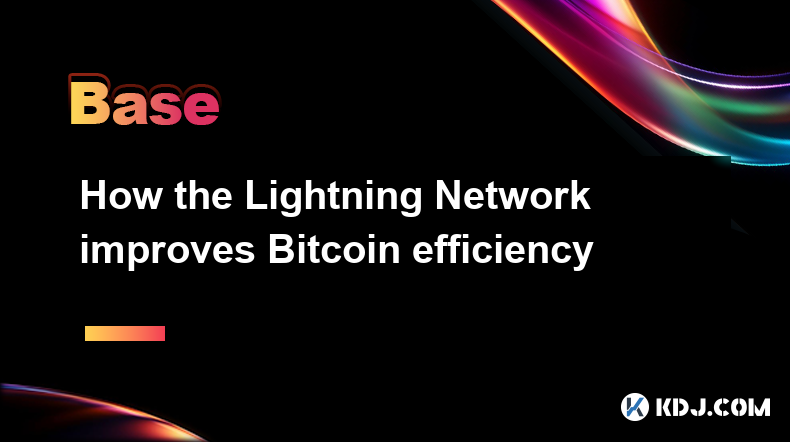
How the Lightning Network improves Bitcoin efficiency
Apr 17,2025 at 08:56pm
The Lightning Network represents a significant advancement in the Bitcoin ecosystem, aiming to address some of the most pressing issues related to transaction speed and cost. By enabling off-chain transactions, the Lightning Network drastically improves Bitcoin's efficiency, allowing for faster and cheaper transactions. This article will explore how the...

Analysis of the KYC process of cryptocurrency exchanges
Apr 17,2025 at 05:07pm
The Know Your Customer (KYC) process is a critical component in the operations of cryptocurrency exchanges. It serves as a regulatory measure to prevent fraud, money laundering, and other illicit activities. KYC procedures are designed to verify the identity of users and ensure compliance with financial regulations. This article delves into the various ...

What does Floor Price mean in the NFT market
Apr 17,2025 at 12:42am
The term Floor Price is a critical concept within the NFT (Non-Fungible Token) market, serving as a key indicator for both buyers and sellers. In essence, the floor price represents the lowest price at which an NFT from a particular collection is currently listed for sale on a marketplace. This price point is crucial for understanding the perceived valu...
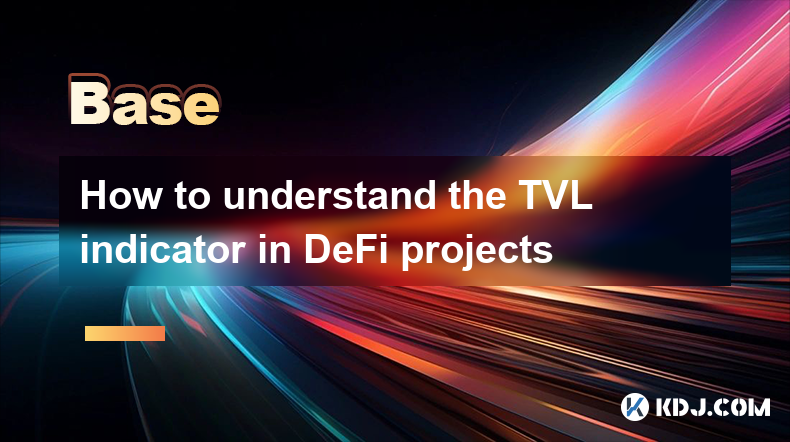
How to understand the TVL indicator in DeFi projects
Apr 17,2025 at 03:28pm
Understanding the TVL indicator in DeFi projects is crucial for investors and enthusiasts looking to gauge the health and popularity of decentralized finance platforms. TVL, or Total Value Locked, represents the total amount of assets that are currently staked or locked in a DeFi protocol. This metric serves as a barometer for the trust and interest tha...
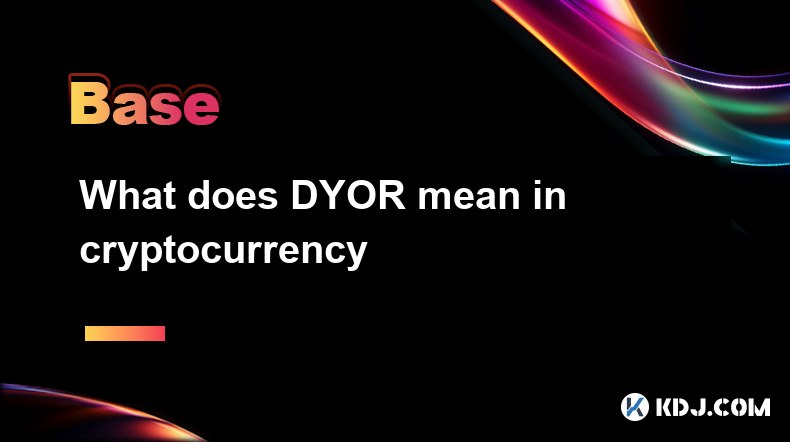
What does DYOR mean in cryptocurrency
Apr 17,2025 at 03:00pm
DYOR, or 'Do Your Own Research,' is a crucial mantra in the cryptocurrency community. It emphasizes the importance of individuals conducting their own thorough investigations before making any investment decisions. In the fast-paced and often volatile world of cryptocurrencies, relying solely on others' advice or the hype surrounding a particular coin c...
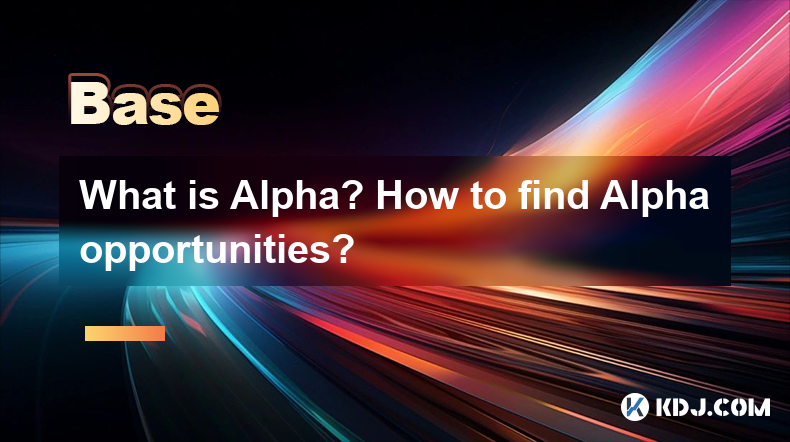
What is Alpha? How to find Alpha opportunities?
Apr 16,2025 at 12:42pm
What is Alpha?Alpha is a term widely used in the financial world, including the cryptocurrency market, to describe the ability of an investment to outperform a benchmark. In the context of cryptocurrencies, alpha refers to the excess return an investor achieves over the market's average return. For example, if the overall crypto market grows by 10% in a...

How the Lightning Network improves Bitcoin efficiency
Apr 17,2025 at 08:56pm
The Lightning Network represents a significant advancement in the Bitcoin ecosystem, aiming to address some of the most pressing issues related to transaction speed and cost. By enabling off-chain transactions, the Lightning Network drastically improves Bitcoin's efficiency, allowing for faster and cheaper transactions. This article will explore how the...

Analysis of the KYC process of cryptocurrency exchanges
Apr 17,2025 at 05:07pm
The Know Your Customer (KYC) process is a critical component in the operations of cryptocurrency exchanges. It serves as a regulatory measure to prevent fraud, money laundering, and other illicit activities. KYC procedures are designed to verify the identity of users and ensure compliance with financial regulations. This article delves into the various ...

What does Floor Price mean in the NFT market
Apr 17,2025 at 12:42am
The term Floor Price is a critical concept within the NFT (Non-Fungible Token) market, serving as a key indicator for both buyers and sellers. In essence, the floor price represents the lowest price at which an NFT from a particular collection is currently listed for sale on a marketplace. This price point is crucial for understanding the perceived valu...

How to understand the TVL indicator in DeFi projects
Apr 17,2025 at 03:28pm
Understanding the TVL indicator in DeFi projects is crucial for investors and enthusiasts looking to gauge the health and popularity of decentralized finance platforms. TVL, or Total Value Locked, represents the total amount of assets that are currently staked or locked in a DeFi protocol. This metric serves as a barometer for the trust and interest tha...

What does DYOR mean in cryptocurrency
Apr 17,2025 at 03:00pm
DYOR, or 'Do Your Own Research,' is a crucial mantra in the cryptocurrency community. It emphasizes the importance of individuals conducting their own thorough investigations before making any investment decisions. In the fast-paced and often volatile world of cryptocurrencies, relying solely on others' advice or the hype surrounding a particular coin c...

What is Alpha? How to find Alpha opportunities?
Apr 16,2025 at 12:42pm
What is Alpha?Alpha is a term widely used in the financial world, including the cryptocurrency market, to describe the ability of an investment to outperform a benchmark. In the context of cryptocurrencies, alpha refers to the excess return an investor achieves over the market's average return. For example, if the overall crypto market grows by 10% in a...
See all articles


















































































